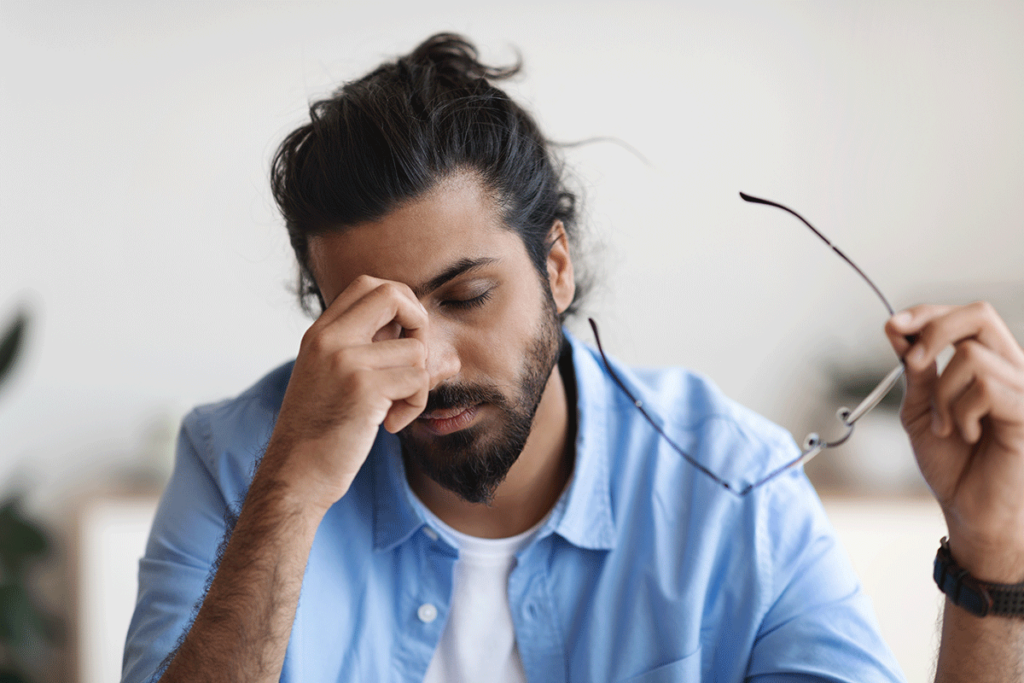Anxiety is a mental health disorder that many individuals struggle with. It is characterized by intense feelings of worry, fear, or anxiety that are strong enough to interfere with a person’s daily functioning. While it is normal to worry or feel anxious occasionally, if you are unable to set aside these feelings and they intrude on your daily activities, it is likely an anxiety disorder.
People struggling with anxiety are also likely to experience symptoms such as panic attacks, irritability, fatigue, excessive worry, and nausea. Certain events or circumstances can trigger anxiety symptoms, and learning how to avoid these anxiety triggers is critical for managing it.
At Northpoint Nebraska, we provide an anxiety treatment program to help our patients identify their triggers for anxiety and develop healthy coping strategies they can implement in their daily lives. Contact us at 888.351.3834 to learn how we can help.
What Are Some Common Anxiety Triggers?
An anxiety trigger is a situation or action that leads to feelings of worry or fear. In some cases, a trigger can lead to a panic attack which is a severe episode of intense fear or anxiety. Understanding common anxiety triggers help identify what triggers your anxiety.
Some of the most common anxiety triggers are:
- Stress — Stress from significant life changes such as job loss, college graduation, or moving can trigger anxiety.
- Health issues — Health conditions such as chronic illness, heart problems, or low blood sugar can trigger anxiety.
- Caffeine — Consumption of caffeinated beverages like coffee or soda can trigger anxiety and make symptoms worse.
- Medications — Certain prescriptions or over-the-counter medications like birth control and cough and congestion medicine can worsen anxiety symptoms.
- Financial distress or concerns — Concerns about paying bills, high debt, or future expenses can be a trigger for anxiety.
- Socializing — Attending parties or large gatherings where you are around many strangers or need to make small talk can trigger social anxiety
- Conflict — Conflict at work, school, or home can create additional stress in your life and trigger anxiety.
- Not enough sleep — A lack of sleep or poor quality sleep can trigger anxiety.
- Relationship problems — Problems in your personal relationships with a spouse, parent, or family member can trigger anxiety.
- Self-neglect — Not taking care of your physical or mental health can cause anxiety symptoms to worsen.
- Substance abuse — Abusing substances significantly affects your mental and emotional well-being and can trigger anxiety.
How to Avoid Anxiety Triggers
There are many different ways to avoid anxiety triggers and manage anxiety symptoms. Some small solutions for avoiding certain triggers for anxiety include limiting or stopping caffeine consumption and changing medications. Other practices for how to avoid anxiety triggers could be meeting with a financial advisor, exercising routinely, eating well, and creating a healthy sleep schedule. These practices can help reduce overall stress, financial concerns, and sleep problems. To avoid social anxiety triggers, it can be helpful to attend parties or social gatherings with a friend, so you have people you know and can talk to.
Anxiety treatment that includes counseling or other forms of therapy can be extremely beneficial for avoiding or managing triggers for anxiety. Learning to communicate effectively, improving your self-esteem, and developing healthy coping skills are essential for managing anxiety and stress overall. It is not uncommon for a person struggling with substance abuse to have a co-occurring mental health disorder like anxiety. The individual must seek a dual diagnosis program that treats both disorders simultaneously.
Benefits of Anxiety Treatment
There are a lot of reasons to seek treatment for anxiety. Here are some of the top benefits:
Improved Coping Skills
Through therapy, you will learn how to better cope with anxious thoughts and feelings. Therapists can provide you with effective strategies and tools to manage anxiety in your daily life.
Reduced Physical Symptoms
Anxiety can manifest in a variety of physical symptoms, such as headaches, muscle tension, and fatigue. By addressing the root causes of your anxiety, treatment can help alleviate these physical symptoms.
Better Relationships
Anxiety can strain relationships with friends, family, and romantic partners. Therapy can help you improve communication and develop healthier patterns in your relationships.
Increased Self-Awareness
Through the therapeutic process, you will gain a deeper understanding of yourself and your triggers for anxiety. This self-awareness can help you make positive changes in your life and prevent future episodes of anxiety.
Improved Overall Mental Health
Anxiety can often coexist with other mental health issues, such as depression or substance abuse. By treating your anxiety, you may also see improvements in these coexisting conditions.
Better Quality of Life
Ultimately, the goal of anxiety treatment is to improve your overall quality of life. By reducing symptoms and improving coping skills, therapy can help you feel happier, more confident, and more at peace in your day-to-day life.
Finding the Right Anxiety Treatment at Northpoint Nebraska
Anxiety is common and is a condition many people experience. If you or someone you know is struggling with anxiety, our team can help you. To learn more about our anxiety treatment program, reach out to Northpoint Nebraska at 888.351.3834 or use our online contact form.




